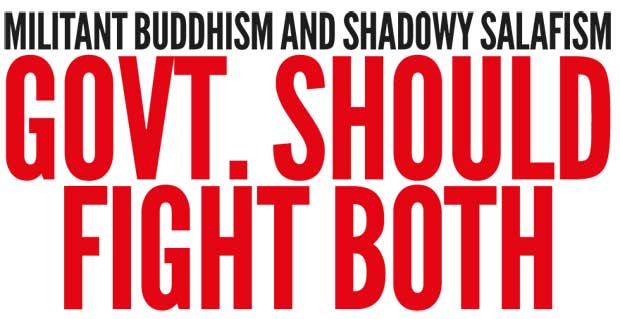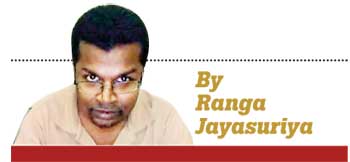Reply To:
Name - Reply Comment

 he outbursts of Sinhala-Buddhist ultra-nationalism in the South have often been cyclical. They take place with the connivance, and when it was not the case, complacency of the government in power. A closer look at this periodic rage would also reveal, since the Black July in 1983, which was facilitated by the government’s inaction and active collaboration of some of its ministers, subsequent episodes of Sinhala-Buddhist ultra-nationalism have taken place broadly without any association with the terrorist war of the LTTE.
he outbursts of Sinhala-Buddhist ultra-nationalism in the South have often been cyclical. They take place with the connivance, and when it was not the case, complacency of the government in power. A closer look at this periodic rage would also reveal, since the Black July in 1983, which was facilitated by the government’s inaction and active collaboration of some of its ministers, subsequent episodes of Sinhala-Buddhist ultra-nationalism have taken place broadly without any association with the terrorist war of the LTTE.
In the early 2000’s, while the country was facing an existential threat from terrorism, a quasi-militant form of Sinhala-Buddhist radicalism sprung up with their primary target being the alleged aggressive proselytizing by evangelical Christian missionaries. A series of makeshift churches were attacked. Then in 2011, while the country was still reeling from the after-effects of a devastating war, another episode of ultra-nationalist Sinhala Buddhism popped up. This time the target was Muslims: Halal certificates, cow slaughter and the allegations of growing Islamic radicalism.
None of the above perceived concerns of Sinhala-Buddhist radicals was a grievance of the majority Sinhalese. However, ultra-nationalists managed to smuggle in their sinister agenda into the mainstream discourse. It is always dangerous to let bigots set or manipulate the national agenda. But, how did that happen in this country, not once, but periodically?
The problem has always been the government’s lethargy towards the creeping radicalism or covert cooperation with Sinhala-Buddhist ultra-nationalism. That was partly due to electoral calculations. The success of the Jathika Hela Urumaya in some of Colombo suburbs such as Maharagama and  Kaduwela, which were otherwise traditional Centre Right electorates generally favorable to the UNP, highlighted the appeal of religious nationalism even to the urbanites. And cognitive bias of Rajapaksas also made them embrace religious radicalism of the Bodu Bala Sena (BBS). The bottom line was that the successive governments did not really consider Sinhala ultra-nationalism as a credible threat, instead viewed it as a useful ally.
Kaduwela, which were otherwise traditional Centre Right electorates generally favorable to the UNP, highlighted the appeal of religious nationalism even to the urbanites. And cognitive bias of Rajapaksas also made them embrace religious radicalism of the Bodu Bala Sena (BBS). The bottom line was that the successive governments did not really consider Sinhala ultra-nationalism as a credible threat, instead viewed it as a useful ally.
In the early 2000s, when churches were attacked, Chandrika Kumaratunga administration, cracked down on militant Buddhism, making several arrests. However, even then the government did not wish to get to the bottom of the problem. No arrests were made in a bomb attack on a musical concert which killed two in Colombo.
Now the intelligence agencies say there are 40 odd extremist groups operating in the country- including the BBS and Thawheed Jamath, the ultra-orthodox Islamic group which is growing in number and influence within the Muslim community. Those groups operate openly as well as in the shadows. They do not appear prominently in the national security agenda, partly because the current mainstream dialogue itself downplays national security imperatives for the sake of reconciliation and democratization. The danger in that approach is that neither reconciliation nor democracy can be sustainable without national security for there will always be groups that exploit the vacuum to advance their sinister agendas.
It was the failure of the intelligence and security apparatus, partly due to inadequacy of resources, to monitor the threats of Tamil militancy in the North and JVP in the South that helped those incipient threats to grow into monstrous proportions which convulsed this country in three brutal rebellions. It was the same failure that led to beleaguered governments to deploy extra-judicial means to fight terrorism and insurgency for the sake of long term stability. Now the government should not take chances. Intelligence services should be given adequate clearance to monitor these groups, both Sinhala-Buddhist and Muslims and make arrests where necessary.
In the past, fighting extremism within criminal justice laws was considered to be the best practice, however, more often than not, such laws proved to be inadequate and played into the hands of terrorists.The current political discourse does not favour the Prevention of Terrorism Act, for it was at times abused, but also helped lock up potentially dangerous terrorists, who if they had stayed at large, could have blown up a couple of more bombs. The civil society also opposed a proposed legislation on banning hate-speech for it could affect free speech. But the same groups now cry foul only when the Sinhala-bigots spew hatred.
The government should bring back the proposed ban on hate-speech. It should also consider potential future security concerns and have remedies for such eventualities in its new security law with which it seeks to replace the Prevention of Terrorism Act. The world is not a utopia. Sri Lanka’s past sordid experience should compel a rational policymaker not to take any chances.
A country cannot fight extremism when its laws are inadequate or security agencies have hands tied behind their back. Hate speech could well be free speech, depending on the receptive audience, but the long-term radicalizing effect of such would not be nice. Their adherents in the long run would not operate within democratic parameters. It is better to lock up the trouble makers now under existing laws or new laws, than leave room for a desperate future government to bring backs white vans, when the threat multiplies. Ultra-nationalism does have many forms of utility. The rise of JVP in the mid-80s happened in the backdrop of rising anti-Indian nationalism. Islamic extremism is richly used in the Middle East and Pakistan for regime legitimization. One of those local Muslim politicians could well be tempted to try his or her luck. Once the wheel of radicalization is put into motion, it takes a life of its own.
It is always good to promote inter-ethnic dialogue, which seems to be the government’s main strategy. At the moment, where extremism is still incipient, it could work. But, it could also give an undue national recognition to groups like the BBS. What is equally dangerous is that it could well provide a convenient smoke screen for growing ‘Salafication’ of some sections of Sri Lankan Muslims. That potential radicalization could well be many times more dangerous than the usual Sinhala Buddhist antics of the BBS. It may be politically incorrect to note, but the propensity for violence in the two ideologies differ vastly.
There is another hard fact. Even during its peak, Sinhala-Buddhist ultra-nationalism has been a nuisance, rather than an existential threat to ethnic minorities. Now there are some who try to project it as a mortal threat to the minorities; that is in a way of advancing the narrative concocted by Eelam Tamil separatism. This misrepresentation helps no one, but it has become a pastime of some. It is not just discrediting Sinhalese or Sinhala Buddhist, which is generally the intention, but it could more dangerously radicalize some sections of the Muslim youth, as the Tamil narrative did to zombiefy hordes of Tamil youth into suicide bombers. So that may not be the best strategy, if you only want to pique the Sinhala-Buddhists.